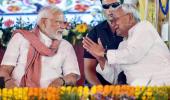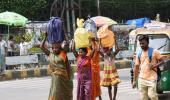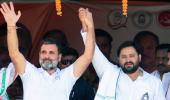'There were deep discussions within the Sangh Parivar before this decision was made.'
'They were convinced, and only then did the Modi government proceed with the caste census.'

Prime Minister Narendra Modi's government surprised political observers on Wednesday, April 30, 2025, evening when it stated that a caste census would take place in India.
The announcement came at a time when the nation expects the Modi government to act against Pakistan after terrorists killed 26 tourists in Pahalgam, Kashmir.
The Bharatiya Janata Party had opposed the caste census, and its leaders often stated that the Congress demand for a caste census would weaken India.
Social media handles that support the BJP frequently trolled Congress leader Rahul Gandhi whenever he spoke about conducting a caste census in India, claiming he was trying to divide Hindus like the British did.
The last caste census in India was conducted in 1931.
In 1941, during World War II, the British did not conduct a census.
In 1951, Jawaharlal Nehru's government did away with the caste census.
So, what made the Modi government decide to conduct a caste census?
Syed Firdaus Ashraf/Rediff spoke to Justice V Eswaraiah, former chairperson of the National Commission for Backward Classes, to know more.
Why do you think the government has announced a caste census?
In the past, we have been fighting for a caste census in India, but the BJP never agreed to it.
They even told the Supreme Court that it was not their policy to conduct a caste census.
They also told the apex court that they would not publish the 2011 socio-economic census as there were some aberrations.
This made everyone feel that the BJP was against the caste census.
Congress leader Rahul Gandhi took advantage of the BJP's stance and made it his agenda to push for a caste census.
But Rahul is a very meek and unpredictable person.
During the Bharat Jodo Yatra, he mentioned the caste census, stating, 'Jiski jitni sankhya bhaari, uski utni hissedari (The greater the caste population, the greater its share).'
He was speaking lies as he did not implement the caste census in two Congress-ruled states -- Telangana and Karnataka.
It looks like the caste census has taken precedence over the imminent war with Pakistan.
Whether there is a war with Pakistan or not is a different issue altogether, compared to the caste census.
I am referring to the timing -- why now?
They have to conduct the (population) census anyway. So, they are doing the caste census at the same time.
They can carry out both in one go.
There are no imminent elections, and yet the Modi government is going ahead with the caste census.
This is the right time for the Modi government to hold the caste census.
The scheduled castes, scheduled tribes, and other lower castes have long demanded it.
They were never concerned about the timing -- they simply wanted it, and the government is fulfilling that demand now.
It looks like the BJP has hijacked the Congress agenda on the caste census.
After the BJP's move on the caste census, the Congress will be politically cornered.
They will have no place left (in national politics). The people of India will tilt toward the BJP after the caste census.
The BJP will surely form the government again in 2029. Don't be surprised if they come to power again.
What about upper caste Hindus? Won't they be upset?
They are prepared to share their share (of the pie) in politics, education, and employment. If they don't, they would have suffered badly under Congress rule in the future.
The upper castes were mentally prepared for the caste census.
There were deep discussions within the Sangh Parivar before this decision was made.
They were convinced, and only then did the Modi government proceed with the caste census.
They realised that without the caste survey, they won't survive (in politics).
What kind of social change do you expect to happen on the ground?
Nobody can stop social change or social transformation on the ground.
How long can you continue to suppress people from taking steps toward social change? You simply can't do that forever.
What kind of social suppression do OBCs or Dalits face that deprives them of national resources meant for the common good?
The total upper caste population is 15 percent, and they have received 10 percent reservation under the Economically Weaker Sections quota.
Among this 15 percent, half are already rich.
So effectively, 7 percent of the population is benefiting from 10 percent the EWS reservation.
Moreover, upper castes have access to every sector. They have tremendous opportunities compared to the lower castes.
Which upper caste person works as a daily wage labourer or a rickshaw puller? Upper castes are born with a silver spoon.
How will the caste census help the lower castes?
Once the caste census is done, the whole picture will become clear.
In other words, it will be like an X-ray of India. It will provide figures showing which dominant castes are running sectors like healthcare, industry, the judiciary, employment, and more.
The caste census will give an idea how these resources and opportunities need to be distributed.
Is this the biggest social revolution in India after the Mandal Commission report?
Yes, the caste census is the biggest revolution to happen in India since the Mandal Commission.
It will lead to a fairer distribution of positions in different fields -- education, employment, and even the judiciary.
Do you think the distribution of resources will really happen after the caste census, or will it just be symbolic?
Yes, it will happen. A revolution will follow once the caste census data is released.
Even if they (the upper castes) try to retain power afterward, the backward castes will become more aware.
They (the upper castes) will have to relinquish their hold on power.
Wealth is currently concentrated among the upper castes. Do you think they will easily share it with the lower castes?
Politics is business. If backward castes gain power at the zilla parishad, assembly, or parliamentary level, their social and economic conditions will change.
Once political power is in their hands, they will rise just like other castes.
The upper castes are politically and economically powerful today because they held political power.
Give the same political power to the backward castes, and you will see them become economically powerful too.
Political power is the master key to all solutions.










